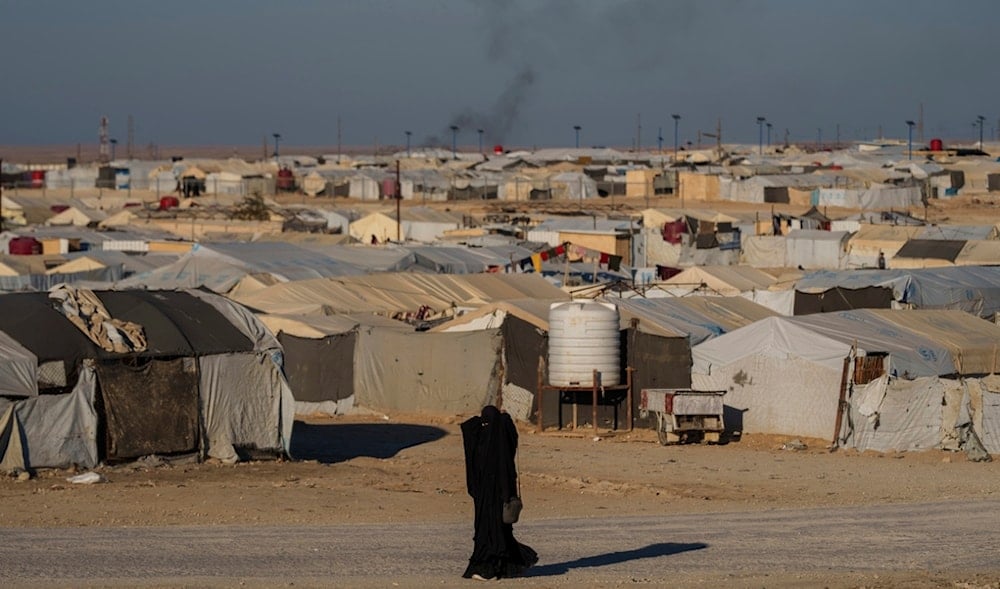Syrian government visits Al-Hol camp in first since deal with Kurds
Syrian government delegation visits Al-Hol camp for the first time since Kurdish deal, while talks focus on relocating families of ISIS suspects and integrating Kurdish regions.
-

A woman walks in the al-Hol camp in northeastern Syria's Hasakeh province, Thursday, Jan. 30, 2025 (AP)
A Syrian government delegation visited the notorious al-Hol camp in the country’s northeast on Saturday, marking the first official visit since an agreement was reached between interim President Ahmad al-Sharaa and Mazloum Abdi, commander of the US-backed Syrian Democratic Forces (SDF).
The visit, confirmed by both sides, took place in the Kurdish-administered region and was part of a tripartite meeting that included representatives from the Syrian transitional government, the US-led international coalition, and the Kurdish autonomous administration.
Al-Hol, the largest detention camp in northeastern Syria, currently houses approximately 37,000 individuals from multiple nationalities, including 14,500 Iraqis. Many detainees are relatives of suspected ISIS members, and living conditions in the camp have been widely described as dire.
Focus on relocating Syrian families
Sheikhmous Ahmed, a senior Kurdish administration official, stated that discussions during the meeting centered on "establishing a mechanism for removing Syrian families from Al-Hol camp." He added that this marked an initial practical step under the political agreement signed earlier this year.
In Damascus, Interior Ministry spokesperson Noureddine al-Baba affirmed that the al-Hol issue was "part of the agreement" between al-Sharaa and Abdi. He emphasized that a “comprehensive societal solution” is needed for families who have been victimized by ISIS.
Context: Kurdish-Syrian Agreement
In March, al-Sharaa and Abdi announced a landmark agreement to begin integrating the Kurdish civil and military structures into the Syrian national framework. The deal includes guarantees for the return of all Syrian nationals displaced by war, particularly those residing in camps across the northeast.
However, little progress has been reported on the formal integration of the Kurdish administration into the new interim Syrian government since the removal of former President Bashar al-Assad in December.
Unresolved issues: Prisons and foreign nationals
The future of high-security detention facilities in the northeast, where thousands of captured ISIS fighters are held, remains unclear. In February, Abdi said that the new authorities intended for these prisons to fall under Damascus's jurisdiction, but no formal transfer has taken place.
Al-Hol also includes a fortified section for families of foreign ISIS militants. Kurdish officials have stated that the fate of these families largely depends on the policies of their home countries and decisions from the US-led international coalition. Despite repeated appeals for repatriation, most Western governments have been reluctant to return their citizens due to security concerns and domestic political pressure.
Broader repatriation goals
In coordination with the United Nations, the Kurdish administration previously declared its aim to empty the camps of displaced Syrians and Iraqi refugees by the end of this year. Saturday’s meeting is seen as an early step toward that goal, though significant challenges remain in repatriating foreign nationals and resolving long-term legal and security issues tied to former ISIS affiliates.
Read more: Kurdish leader warns centralization may divide Syria, spark civil war

 3 Min Read
3 Min Read








